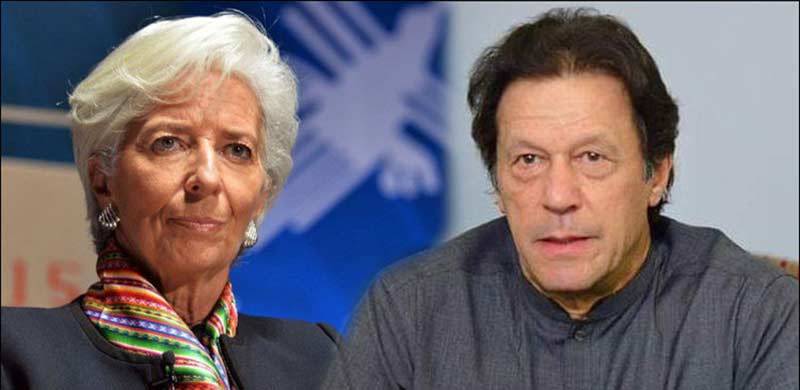
ISLAMABAD: Government is likely to increase electricity and gas tariffs in August 2019, revealed an IMF report on Tuesday. The report further reveals that the government is bound to implement the Financial Action Task Force’s (FATF) 27-point action plan in three months as part of the $6 billion programme agreed upon by the IMF.
The staff level report carries a list of disclosures which were previously not reported by the government itself. Pakistan Tehreek-e-Insaf's government had earlier announced to impose Rs 516 billion of taxes. However the said report mentions another figure i.e. Rs 733.5 billion.
The $6 billion package further entails that Pakistan won't be allowing any additional tax amnesty schemes after the scheme, which ended on July 3, 2019.
Express Tribune reports that the IMF will monitor implementation of conditions through 13 quarterly performance criteria and continuous performance criteria.
Tariff Hike
As part of quarterly adjustments agreed upon with the IMF, the government will be enforcing a second quarterly adjustment before the end of August 2019. In another IMF condition, the government is bound to submit an amended Nepra Act to parliament by the end of December.
This development comes in to ensure full automaticity of the quarterly tariff adjustments and eliminating the gap between the regular annual tariff determination by the regulator and the notification by the government, reports The Express Tribune.
“Currently, households consuming 300 units or below (about 70 percent of all household consumers) are insulated from annual tariff increases. The authorities will continue with this practice and will moreover allocate for this year a new subsidy equivalent to 0.1–0.2 percent of GDP to insulate those same consumers from the impact of the recently introduced quarterly tariff adjustment,” the report said.
“Eliminating power sector losses on a sustainable basis will require both new pricing policies and improvements in governance and infrastructure. There are three main sources of arrears in the power sector: effective tariffs below the required levels and only approved with significant delays; implicit subsidies provided by the government that has long remained unbudgeted; and technical and distribution losses. The authorities aim to address the first two sources in the near term while preparing a plan to tackle the third source of arrears over the course of the program, "the report added.
Exchange Rate
While referring to the exchange rate regime, which is often debated, the report mentions that the State Bank of Pakistan has been following a market-determined exchange rate regime since May 2019.
“A flexible market-determined exchange rate and an adequately tight monetary policy will be key to correcting imbalances, rebuilding reserves, and keeping inflation low. In this regard, measures to strengthen the State Bank of Pakistan’s (SBP) autonomy and eliminate central bank financing of the budget deficit will enable the SBP to deliver on its mandate of price and financial stability," the report added.
The report was critical of Pakistan's case in the Financial Action Task Force and emphasized upon the ongoing economic situation with large scale fiscal and financial needs of the country.
The staff level report carries a list of disclosures which were previously not reported by the government itself. Pakistan Tehreek-e-Insaf's government had earlier announced to impose Rs 516 billion of taxes. However the said report mentions another figure i.e. Rs 733.5 billion.
The $6 billion package further entails that Pakistan won't be allowing any additional tax amnesty schemes after the scheme, which ended on July 3, 2019.
Express Tribune reports that the IMF will monitor implementation of conditions through 13 quarterly performance criteria and continuous performance criteria.
Tariff Hike
As part of quarterly adjustments agreed upon with the IMF, the government will be enforcing a second quarterly adjustment before the end of August 2019. In another IMF condition, the government is bound to submit an amended Nepra Act to parliament by the end of December.
This development comes in to ensure full automaticity of the quarterly tariff adjustments and eliminating the gap between the regular annual tariff determination by the regulator and the notification by the government, reports The Express Tribune.
“Currently, households consuming 300 units or below (about 70 percent of all household consumers) are insulated from annual tariff increases. The authorities will continue with this practice and will moreover allocate for this year a new subsidy equivalent to 0.1–0.2 percent of GDP to insulate those same consumers from the impact of the recently introduced quarterly tariff adjustment,” the report said.
“Eliminating power sector losses on a sustainable basis will require both new pricing policies and improvements in governance and infrastructure. There are three main sources of arrears in the power sector: effective tariffs below the required levels and only approved with significant delays; implicit subsidies provided by the government that has long remained unbudgeted; and technical and distribution losses. The authorities aim to address the first two sources in the near term while preparing a plan to tackle the third source of arrears over the course of the program, "the report added.
Exchange Rate
While referring to the exchange rate regime, which is often debated, the report mentions that the State Bank of Pakistan has been following a market-determined exchange rate regime since May 2019.
“A flexible market-determined exchange rate and an adequately tight monetary policy will be key to correcting imbalances, rebuilding reserves, and keeping inflation low. In this regard, measures to strengthen the State Bank of Pakistan’s (SBP) autonomy and eliminate central bank financing of the budget deficit will enable the SBP to deliver on its mandate of price and financial stability," the report added.
The report was critical of Pakistan's case in the Financial Action Task Force and emphasized upon the ongoing economic situation with large scale fiscal and financial needs of the country.
